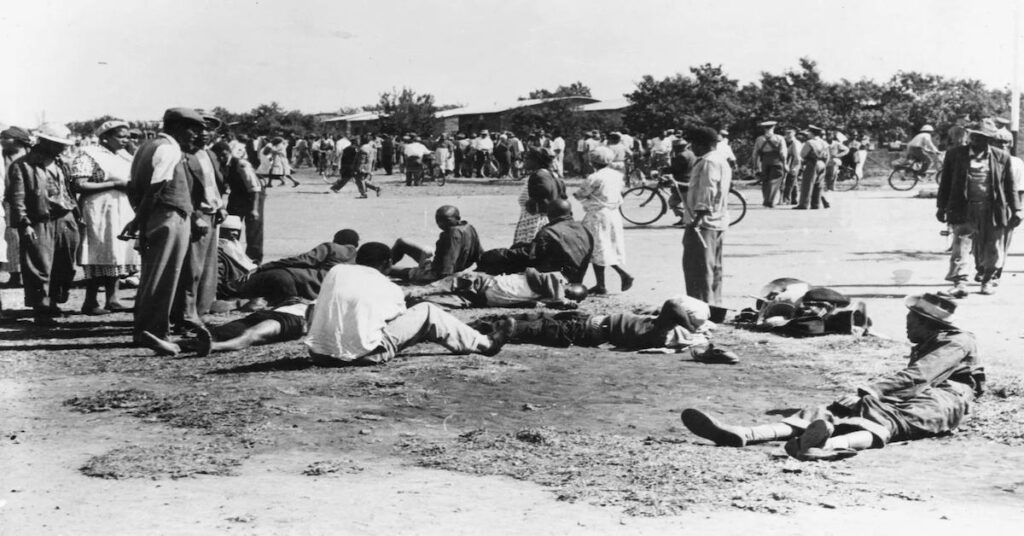South Africa Apartheid:
Politically sanctioned racial segregation was a bigoted political and social framework in South Africa Apartheid during the time of white minority rule. It upheld racial victimization of non-whites, predominantly centered around skin tone and facial highlights. This existed in the 20th century, from 1948 until the mid-1990s.
Politically-sanctioned racial segregation is known as the ‘Modeler of the Apartheid’ Hendrik Verwoerd was Prime Minister as head of the National Party from 1958-66 and was vital in forming the execution of the politically-sanctioned racial segregation strategy.


Credits: Britannica
South Africa Stop apartheid:
It required many years of activism from both inside and outside the country, as well as global monetary tension, to end the system that permitted the nation’s white minority to oppress its Black larger part. This work finished with the destruction of politically sanctioned racial segregation somewhere in the range between 1990 and 1994.
Facts about apartheid:
- The whites had their direction and say.
- Interracial relationships were condemned.
- Dark South Africans couldn’t possess property.
- Instruction was isolated.
- Politically sanctioned racial segregation was portrayed by a dictator political culture given backup, which guaranteed that South Africa was overwhelmed strategically, socially, and financially by the country’s minority white populace.
- The most renowned detainee was the head of the ANC, Nelson Mandela, who had turned into an image of the counter-Apartheid battle.
The Three apartheid laws:
The Immorality Act, of 1927 denied extramarital sex between white individuals and individuals of color. The Prohibition of Mixed Marriages Act, of 1949 denied relationships between white individuals of different races. The Immorality Amendment Act, of 1950 denied extramarital sex between white endlessly individuals of different races.
1. The Immorality Act(1950):
The immorality act criminalizes and intimidates relationships and marriages between different racial groups. It prohibited the intimacy between the races and contributed to the social segregation enforced by apartheid.
2. The Prohibition of Mixed Marriages Act(1949):
The prohibition of the Mixed Marriages Act is a crime for any marriage to take place between a white person and a person of any other racial group.
3. The Pass Laws
The Pass laws made it compulsory for blacks to carry passbooks (Identity cards) at all times, which allowed them to have permission to be in a white area for a limited amount of time. this is the most hated law in South Africa.
Beginning of the politically-sanctioned racial segregation:
The Great Depression and World War II carried expanding financial hardships to South Africa and persuaded the public authority to fortify its approaches to racial isolation. In 1948, the Afrikaner National Party government won the overall political decision under the trademark “politically sanctioned racial segregation”
The National Party government:
Deciphered from the Afrikaans signifying ‘apartness’, politically-sanctioned racial segregation was the philosophy upheld by the National Party government and was presented in South Africa in 1948. Politically sanctioned racial segregation required the different advancement of the different racial gatherings in South Africa
Apartheid violates human rights:
The arrangement of politically sanctioned racial segregation disregarded the most fundamental precepts of global basic freedom regulation and strategy, typifying an unforgiving blend of state-supported tyranny, militarism, race and orientation separation, and monetary double-dealing.
The apartheid affects the individuals’ lives:
Pass regulations and politically-sanctioned racial segregation strategies disallowed Black individuals from entering metropolitan regions without promptly getting a new line of work. It was unlawful for a Black individual not to convey a passbook. Individuals of color couldn’t wed white individuals. They couldn’t set up organizations in white regions.
The world responds to politically-sanctioned racial segregation:
During the politically-sanctioned racial segregation period one of the primary ways that the global-local area showed their dismissal of politically-sanctioned racial segregation was through boycotting South Africa in different circles. Blacklists included financial or buyer blacklists, scholastic, social, and game blacklists.
Conclusion:
The finish of South Africa Apartheid finished a lot of Southern Africa’s contention and permitted dark-managed states to join in far more noteworthy collaboration for the social and monetary turn of events. The mediation of South African soldiers all through Africa was likewise significantly decreased.
Credits: Hip Hughes
